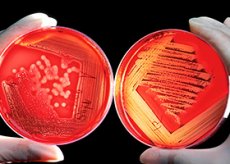Medical expert of the article
New publications
The problem of autism: how can bacteria help?
Last reviewed: 02.07.2025

All iLive content is medically reviewed or fact checked to ensure as much factual accuracy as possible.
We have strict sourcing guidelines and only link to reputable media sites, academic research institutions and, whenever possible, medically peer reviewed studies. Note that the numbers in parentheses ([1], [2], etc.) are clickable links to these studies.
If you feel that any of our content is inaccurate, out-of-date, or otherwise questionable, please select it and press Ctrl + Enter.

Symptoms of autism in childhood can be corrected with the help of beneficial bacteria.
The bacterial flora that lives in the intestines does not simply participate in digestive processes. Among other abilities of bacteria, one can name their participation in metabolic processes, ensuring the quality of immune protection and even the work of many parts of the brain.
The microbiome communicates with the brain either through a “mediator” (for example, through the immune system) or directly through the fibers of the nervous system that connect the brain and digestive structures. It has been previously reported that bacteria in the intestines can affect the state of the psyche - for example, a deviation in the composition of the flora in one direction or another can increase or decrease the manifestations of depression.
And there's more. Certain psychoneurological pathologies, such as autism, occur against the background of digestive disorders, the development of which clearly depends on the composition of the microbiome. It is a known fact that "autistic" children have a relatively poor composition of bacteria in the intestines, compared to healthy children. The absence of Prevotella-type microorganisms in autism is especially clear. Their focus is participation in the regulation of certain immune reactions.
Experts representing the University of Arizona asked themselves the following question: will it be possible to alleviate the condition of children with autism by using certain bacteria? An experiment was conducted involving eighteen “autistic” patients aged 7-17 years. All participants were systematically injected with bacteria present in the microbiome of healthy people for two months.
It is noteworthy that with the start of treatment, the children gradually got rid of digestive disorders and dyspepsia, and at the same time, some signs of autism disappeared. The children became calmer, more assiduous, and their symptoms of obsessive states (for example, repeating one action) significantly weakened. At the same time, their well-being improved for another two months after the end of the experiment.
After completing the work, the scientists continued to observe the participants for another two years. Some children's digestive problems returned. But most still showed a positive trend: the microflora became richer and better, and the symptoms of autism were relieved by about 60%.
The scientists presented the results of the study at the seventh regular Conference of Infectious Disease Specialists, which was held this summer in Madison, Wisconsin.
Many will argue that eighteen participants is too few to draw any firm conclusions. However, such results are still very important for science. The researchers believe that it is very important and necessary to conduct further work in this direction.
Details of the study are presented on the pages https://www.sciencenews.org/article/gut-microbes-autism-symptoms.

